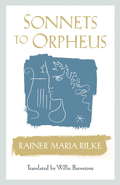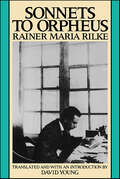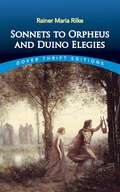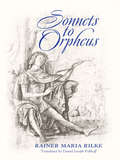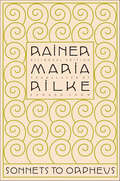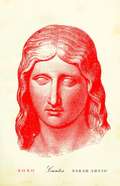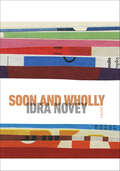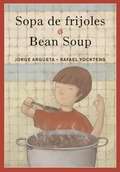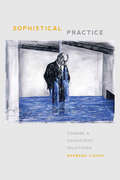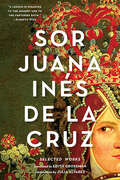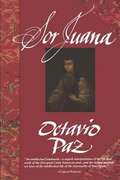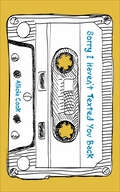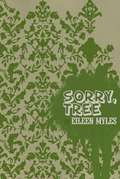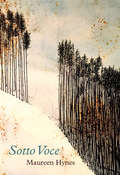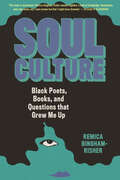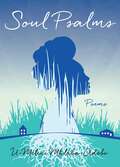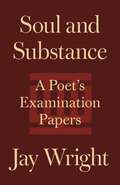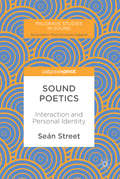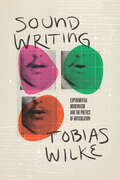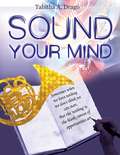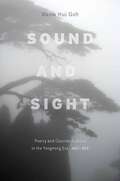- Table View
- List View
Sonnets to Orpheus
by Rainer Maria Rilke Willis BarnstoneWritten during an astonishing outburst of creativity during a period of only two weeks in February 1922, Rilke's Sonnets to Orpheus is one of the great poetic works of the twentieth century. Willis Barnstone brings these striking poems into English with an approach honed through years of work on the philosophy of translation, about which he has written extensively. This dual-language edition allows readers to compare versions face-to-face to get a clear sense of the nuances of the translation. Also included is an extensive introduction from the translator that offers a biographical sketch of Rilke and reflects upon the ever-present tension between the poet's passion for life, romance, and adventure, and his yearning for the solitude he desperately needed to dedicate himself fully to his art.
Sonnets to Orpheus (Wesleyan Poetry in Translation)
by Rainer Maria RilkeSonnets to Orpheus is Rainer Maria Rilke's first and only sonnet sequence. It is an undisputed masterpiece by one of the greatest modern poets, translated here by a master of translation, David Young.Rilke revived and transformed the traditional sonnet sequence in the Sonnets. Instead of centering on love for a particular person, as has many other sonneteers, he wrote an extended love poem to the world, celebrating such diverse things as mirrors, dogs, fruit, breathing, and childhood. Many of the sonnets are addressed to two recurrent figures: the god Orpheus (prototype of the poet) and a young dancer, whose death is treated elegiacally.These ecstatic and meditative lyric poems are a kind of manual on how to approach the world – how to understand and love it. David Young's is the first most sensitive of the translations of this work, superior to other translations in sound and sense. He captures Rilke's simple, concrete, and colloquial language, writing with a precision close to the original.
Sonnets to Orpheus and Duino Elegies: New Poems, Duino Elegies, Sonnets To Orpheus And Others (Dover Thrift Editions)
by Rainer Maria RilkeDuring three feverish weeks in 1922, Rainer Maria Rilke composed the 55 sonnets that constitute Sonnets to Orpheus. Inspired by the death of a friend's daughter, the poet felt that he was being compelled to write by the girl's ghost. At about the same time he also completed Duino Elegies, which he had begun ten years earlier. Intimately connected to the Sonnets in themes and sensibilities, the Elegies offer meditations on love, death, God, and life's meaning that express Rilke's irresolvable conflict between a longing for solitude and a painful loneliness. Although his poetry was recognized and admired by leading European artists, the Austro-Bohemian poet was virtually unknown during his lifetime, achieving international acclaim only with these final masterpieces. This edition presents translations by Jessie Lemont, praised by London's Times Literary Supplement for their presentation of Rilke as "a writer of short individual lyrics, often of incomparable, impressionist vividness, plastic vitality and symbolic suggestiveness."
Sonnets to Orpheus: (bilingual Edition)
by Rainer Maria Rilke Daniel Joseph PolikoffCOMPOSED IN A BURST of inspiration near the end of the poet's life, Rilke's Sonnets to Orpheus represents the consummation of the writer's career, distilling the essence of his poetic wisdom in a gem-like sequence. This new translation--with the original German on facing pages--offers a clear window into the world of this endlessly scintillating cycle of poems. "Daniel Polikoff's English version of Rilke's last sonnet sequence, perhaps his greatest work, is wholly admirable. Rilke's late work is extremely difficult to penetrate. Both its conceptual nature and Rilke's unique use of the German language tend to resist interpretation. Astonishingly, Polikoff has found ways of rendering Rilke's complexities into English and also preserving his metrical and rhyme schemes. Such an accomplishment is possible only with a deep understanding of Rilke's vision and a knowledge of the root structure of German. Daniel Polikoff gives us Rilke in word and spirit in these splendid Sonnets."--LISEL MUELLER, National Book Award for Poetry (1981) for The Need to Hold Still; Pulitzer Prize for Poetry (1997) for Alive Together: New & Selected Poems "Daniel Polikoff is the first to achieve the unimaginable: an English translation which brings the form and content of these Sonnets together into an organic confluence. These new translations lift our understanding of Rilke's spiritual and aesthetic inspiration up to a whole different level, one accessible for the first time to the English reader. As a professor of German literature who has taught these sonnets for over thirty years, I can only thank Daniel Polikoff for this phenomenal accomplishment. His version should serve as the new standard for Rilke translations and belongs on the bookshelves of every poetry lover."--LUDWIG MAX FISCHER, author of Seasons of the Soul: The Poetic Guidance of Herman Hesse "This is a uniquely faithful, skillful, and eloquent translation of one of the greatest poems of the 20th century. I salute Daniel Polikoff and recommend his wonderful work to all seekers and lovers of poetry."--ANDREW HARVEY, author of Teachings of Rumi
Sonnets to Orpheus: (bilingual Edition)
by Rainer Maria RilkeBreathing, you invisible poem!World-space in pure continuous interchangewith my own being. Equiposein which I rhythmically transpire.Written only four years before Rilke's death, this sequence of sonnets, varied in form yet consistently structured, stands as the poet's final masterwork. In these meditations on the constant flux of our world and the ephemerality of experience, Rilke envisions death not only as one among many of life's transformations but also as an ideally receptive state of being. Because Orpheus has visited the realm of death and returned to the living, his lyre, a unifying presence in these poems, is an emblem of fluidity and musical transcendence. And Eurydice, condemned to Hades as a result of Orpheus's backward glance, becomes in Rilke's universe a mythical figure of consolation and hope.Edward Snow, in his translations of New Poems, The Book of Images, Uncollected Poems, and Duino Elegies, has emerged as Rilke's most able English-language interpreter. Adhering faithfully to the intent of Rilke's German while constructing nuanced, colloquial poems in English, Snow's Sonnets to Orpheus should serve as the authoritative translation for years to come.
Sono: Cantos
by Sarah ArvioHere isSono,a new collection of bracingly original poems, from the prizewinning author ofVisits from the Seventh. Composed during a long stay in Rome, these cantos look outward in order to look inward, transforming sights and stories into expressionistic explorations of the state of the heart. Playful, probing, philosophical, colorful, often funny, they describe a struggle to come to terms with loss and grief and to find a basis for renewal; they ask whether and how life is worth living, taking pleasure in the questions themselves. “It wasn’t the life I would have wanted, / had I known what sort of life I did want,” starts the poem entitled “Chagrin. ” “I do believe I was never loved,” announces “Obelisk. ” Riffing expertly, Sarah Arvio brings wit and exquisite formal discipline to her gorgeous meditations on the life lived. These are high-burning songs of the self— colloquial, sexy, unflinching, and unforgettable. A colossal mess I made of my life, in the flesh and also in the round; this was the essence of colosseum, the museum of my colossal shame, where I mused on the blood sport of it all. . . (from "Colosseum")
Sons of Salt
by Yaccaira SalvatierraVolcanic eruptions and waves collide in Yaccaira Salvatierra’s explosive debut collection Sons of Salt, which explores the duality of personal and political landscapes as well as legacies of violence within Mexican-American communities.Sons of Salt poignantly captures the experiences of mothers who battle for their sons’ wellbeing, particularly when fathers are absent due to systemic oppressions.Salvatierra’s verse breaks the bones of poetic form to bring attention to the failures of a conceptually western God who has categorically failed to protect His children, and gives birth instead to a god of nature.Weaving self-made mythology, mourning, and maternal fear into visual and narrative poems, Salvatierra creates a collection that probes the deepest hurt to ensure the holiest redemption.
Soon and Wholly: Poems (Wesleyan Poetry Series)
by Idra NoveyIdra Novey's first collection in a decade, since Patricia Smith chose Exit, Civilian for the National Poetry Series, brings a lyric intimacy to the extremes of our era. The poems juxtapose sweltering days raising children in a city with moments from a rural childhood roaming free in the woods, providing a bridge between those often polarized realities. Novey's spare, contemporary fables move across the Americas, from a woman housesitting in central Chile, surrounded by encroaching fires, to a man in New York about to give birth to a panda. Other poems return to the Allegheny Highlands of Appalachia, where Novey revisits the roads and creeks of her childhood: "Maybe we knew we only appeared/to be floating, but soon and wholly/we'd go under." Like Lydia Davis and Anne Carson, Novey draws from the well of her work translating myriad authors, from Brazilian writer Clarice Lispector to Iranian poet Garous Abdolmalekian, and from her own award-winning novels. These are deeply lived poems, evoking both a singular life and the shared urgencies of our time, a collection of great inventiveness and wit, conjuring our "bit part in the history of the future."[sample text]The Duck Shit at Clarion CreekWe liked to stick it in a BB gun and shoot it.We tattooed with it.We said Hallelujah, the poor man's tanning lotion.Then the frack wells began, something black capping the water and we got high watching a green-backed heron die.We got funny at Clarion, flung each other's underwear into the trees.Why was it we got naked there like nowhere else?Maybe we knew we were getting rusted inside as the trucks we rode into the water.Maybe we only appeared to be floating, but soon and wholly we'd go under, get sucked to the bottom.We'd sink and become creek bed; its deep mud would claim us, hold us hard and close.
Soordaas
by Manager PandeySoordas was a devotee as well as a great poet. He is one of the first poets of Braj. This book investigates the life and literature of Soordas. Manager Pandey presents a very well balanced suggestive and critical writing on the great poet.
Sophistical Practice: Toward a Consistent Relativism
by Barbara CassinSophistics is the paradigm of a discourse that does things with words. It is not pure rhetoric, as Plato wants us to believe, but it provides an alternative to the philosophical mainstream. A sophistic history of philosophy questions the orthodox philosophical history of philosophy: that of ontology and truth in itself.In this book, we discover unusual Presocratics, wreaking havoc with the fetish of true and false. Their logoi perform politics and perform reality. Their sophistic practice can shed crucial light on contemporary events, such as the Truth and Reconciliation Commission in South Africa, where, to quote Desmond Tutu, “words,language, and rhetoric do things,” creating things like the new “rainbow people.” Transitional justice requires a consistent and sustainable relativism: not Truth, but truth for, and enough of the truth for there to be a community.Philosophy itself is about words before it is about concepts. Language manifests itself in reality only as multiplicity; different languages perform different types of worlds; and difficulties of translation are but symptoms of these differences. This desacralized untranslatability undermines and deconstructs the Heideggerian statement that there is a historical language of philosophy that is Greek by essence (being the only language able to say what “is”) and today is German.Sophistical Practice constitutes a major contribution to the debate among philosophical pluralism, unitarism, and pragmatism. It will change how we discuss such words as city, truth, and politics. Philologically and philosophically rethinking the sophistical gesture, relying on performance and translation, it proposes a newparadigm for the human sciences.
Sor Juana Inés de la Cruz: Selected Works
by Julia Alvarez Edith Grossman Juana Inés de la CruzLatin America's great poet rendered into English by the world's most celebrated translator of Spanish-language literature. Sor Juana (1651-1695) was a fiery feminist and a woman ahead of her time. Like Simone de Beauvoir, she was very much a public intellectual. Her contemporaries called her "the Tenth Muse" and "the Phoenix of Mexico," names that continue to resonate. An illegitimate child, self-taught intellectual, and court favorite, she rose to the height of fame as a writer in Mexico City during the Spanish Golden Age. This volume includes Sor Juana's best-known works: "First Dream," her longest poem and the one that showcases her prodigious intellect and range, and "Response of the Poet to the Very Eminent Sor Filotea de la Cruz," her epistolary feminist defense--evocative of Mary Wollstonecraft and Emily Dickinson--of a woman's right to study and to write. Thirty other works--playful ballads, extraordinary sonnets, intimate poems of love, and a selection from an allegorical play with a distinctive New World flavor--are also included.
Sor Juana: Or, The Traps Of Faith
by Octavio Paz Margaret Sayers PedenMexico's leading poet, essayist, and cultural critic writes of a Mexican poet of another time and another world, the world of seventeenth-century New Spain. His subject is Sor Juana Inés de la Cruz, the most striking figure in all of Spanish-American colonial literature and one of the great poets of her age. Her life reads like a novel. A spirited and precocious girl, one of six illegitimate children, is sent to live with relatives in the capital city. She becomes known for her beauty, wit, and amazing erudition, and is taken into the court as the Vicereine's protégée. For five years she enjoys the pleasures of life at court--then abruptly, at twenty, enters a convent for life. Yet, no recluse, she transforms the convent locutory into a literary and intellectual salon; she amasses an impressive library and collects scientific instruments, reads insatiably, composes poems, and corresponds with literati in Spain. To the consternation of the prelates of the Church, she persists in circulating her poems, redolent more of the court than the cloister. Her plays are performed, volumes of her poetry are published abroad, and her genius begins to be recognized throughout the Hispanic world. Suddenly she surrenders her books, forswears all literary pursuits, and signs in blood a renunciation of secular learning. The rest is silence. She dies two years later, at forty-six. Octavio Paz has long been intrigued by the enigmas of Sor Juana's personality and career. Why did she become a nun? How could she renounce her lifelong passion for writing and learning? Such questions can be answered only in the context of the world in which she lived. Paz gives a masterly portrayal of the life and culture of New Spain and the political and ideological forces at work in that autocratic, theocratic, male-dominated society, in which the subjugation of women was absolute. Just as Paz illuminates Sor Juana's life by placing it in its historical setting, so he situates her work in relation to the traditions that nurtured it. With critical authority he singles out the qualities that distinguish her work and mark her uniqueness as a poet. To Paz her writings, like her life, epitomize the struggle of the individual, and in particular the individual woman, for creative fulfillment and self-expression.
Sorry I Haven't Texted You Back
by Alicia CookReturning to the form of Stuff I&’ve Been Feeling Lately, Sorry I Haven&’t Texted You Back is a poetic mixtape dedicated to those who struggle or have struggled with their mental health. Divided into two parts, &“Side A&” holds 92 poems, titled as &“tracks,&” and &“Side B&” holds the &“remixes,&” or blackout-poetry versions, of those 92 poems. The book includes the evergreen themes of love, grief, and hope. Named after Cook&’s viral Instagram poem, Sorry I Haven&’t Texted You Back lands in the crossroads of self-help and poetry.
Sorry Tree
by Eileen MylesMyles' trademark punk-lesbian sensibility and intimate knowledge of poetic tradition are at work in this eighth collection, where every love poem is political, and every political poem is, ultimately, about love.
Sorted Books
by Nina KatchadourianDelighting in the look and feel of books, conceptual artist Nina Katchadourian's playful photographic series proves that books' covers--or more specifically, their spines--can speak volumes. Over the past two decades, Katchadourian has perused libraries across the globe, selecting, stacking, and photographing groupings of two, three, four, or five books so that their titles can be read as sentences, creating whimsical narratives from the text found there. Thought-provoking, clever, and at times laugh-out-loud funny (one cluster of titles from the Akron Museum of Art's research library consists of: Primitive Art/Just Imagine/Picasso/Raised by Wolves), Sorted Books is an enthralling collection of visual poems full of wry wit and bookish smarts.
Sotto Voce
by Maureen HynesPoems that give full attention to a world in shambles, a world in which “mercy is failing.” Maureen Hynes, in her fifth book of poetry, speaks tenderly yet vehemently about the threatened worlds that concern her. From Toronto, where she lives and walks the city’s afflicted watershed, she turns her attention to the near and far, shifting it from the First Nations’ stolen lands to Syria and the refugee crisis in the Mediterranean; from the deaths of family and friends to the newborns into whose care our endangered planet will pass; and from love’s transient regrets to the sustaining love two women share. Hynes’ is a gaze that grieves quietly, delights humbly, and, in the search for solace, never rests. Each poem in Sotto Voce is a recitative of healing. Hear the music in every word and, despite the damaged environments Hynes gives voice to, be restored. This is a book that bears witness to the “dynamite stick of injustice,” one that balances fear and hope, misfortune and renewal, calamity and natural beauty. Sotto Voce carries the complexity and seriousness of its themes lightly—it’s important to know when to speak loudly, and when to whisper. “…Sotto Voce is the sound of one of Canada’s most accomplished poets writing at the height of her powers.” —Jim Johnstone "Whether speaking about nature, or politics, or love, Maureen Hynes does so with candor and compassion. These poems are generous and assured, and the world they circumscribe is the urgent, beautiful, dangerous place where we all live. Read Sotto Voce. Maureen Hynes is a poet at the top of her game.” —Helen Humphreys
Soul Culture: Black Poets, Books, and Questions that Grew Me Up
by Remica Bingham-RisherExamines firsthand the lives of legendary Black writers who made a way out of no way to illuminate a road map for budding creators desiring to follow in their footstepsAcclaimed Cave Canem poet and essayist Remica Bingham-Risher interweaves personal essays and interviews she conducted over a decade with 10 distinguished Black poets, such as Lucille Clifton, Sonia Sanchez, and Patricia Smith, to explore the impact of identity, joy, love, and history on the artistic process. Each essay is thematically inspired, centered on one of her interviews, and uses quotes drawn from her talks to showcase their philosophies. Each essay also delves into how her own life and work are influenced by these elders. Essays included are these:· &“blk/wooomen revolution&”· &“Girls Loving Beyoncé and Their Names&”· &“The Terror of Being Destroyed&”· &“Standing in the Shadows of Love&”· &“Revision as Labyrinth&”Noting the frustrating tendency for Black artists to be pigeonholed into the confines of various frameworks and ideologies—Black studies, women&’s studies, LGBTQIA+ studies, and so on—Bingham-Risher reveals the multitudes contained within Black poets, both past and present. By capturing the radical love ethic of Blackness amid incessant fear, she has amassed not only a wealth of knowledge about contemporary Black poetry and poetry movements but also brings to life the historical record of Black poetry from the latter half of the 20th century to the early decades of the 21st.Examining cultural traditions, myths, and music from the Four Tops to Beyoncé, Bingham-Risher reflects on the enduring gifts of art and community. If you&’ve ever felt alone on your journey into the writing world, the words of these poets are for you.
Soul Looks Back In Wonder
by Tom FeelingsA collection of empowering poetry by acclaimed authors such as Maya Angelou, Langston Hughes, and Askia M. Toure. The collection explores the creativity of the African community and how this creative flow provides hope for future generations.
Soul Psalms: Poems
by U-Meleni Mhlaba-AdeboSoul Psalms, a collection of poems from Zimbabwean American poet U-Meleni Mhlaba-Adebo, is filled with lyrical and vivid imagery that takes you on a emotional journey toward finding self. Exploring themes of family, love, body image, acceptance, and belonging, Mhlaba-Adebo&’s words flow melodically and powerfully, bringing readers to a place of peace. The themes in Soul Psalms may be personal, but they appeal to a universal pull: the desire to become.
Soul and Substance: A Poet's Examination Papers
by Jay WrightA collection of new and startlingly original essays from an acclaimed poet, essayist, and playwrightJay Wright is widely recognized as one of the most important American poets of the past half century. But in recent years, he has also written a series of unconventional essays that he calls “examination papers,” which he defines as “designated inquiries to myself.” In these linked essays, most of which resemble prose-poems, with only a few lines set on each page, Wright explores abiding artistic and philosophical concerns, including language, aesthetic form, knowledge, time, and death. Soul and Substance presents these pieces for the first time.Drawing on everything from African mythology to mathematical axioms, Wright reflects on a wide range of topics: the difficulties of defining and confronting death; the challenge of transcending one’s own consciousness; the nature of rhythm and the structure of space; and the relationship among the self, the body, and the material world. Throughout, the book examines the limits of human knowledge and the implications of our always imperfect understanding.Experimental and original, Soul and Substance is an important addition to the work of a major writer.
Sound Poetics
by Seán StreetThis book examines sonic signals as something both heard internally and externally, through imagination, memory and direct response. In doing so it explores how the mind 'makes' sound through experience, as it interprets codes on the written page, and creates an internal leitmotif that then interacts with new sounds made through an aural partnership with the external world, chosen and involuntary exposure to music and sound messages, both friendly and antagonistic to the identity of the self. It creates an argument for sound as an underlying force that links us to the world we inhabit, an essential part of being in the same primal sense as the calls of birds and other inhabitants of a shared earth. Street argues that sound as a poetic force is part of who we are, linked to our visualisation and sense of the world, as idea and presence within us. This incredibly interdisciplinary book will be of great interest to scholars of radio, sound, media and literature as well as philosophy and psychology.
Sound Writing: Experimental Modernism and the Poetics of Articulation
by Tobias WilkeConsiders the avant-garde rethinking of poetic language in terms of physical speech production. Avant-garde writers and artists of the twentieth century radically reconceived poetic language, appropriating scientific theories and techniques as they turned their attention to the physical process of spoken language. This modernist “sound writing” focused on the bodily production of speech, which it rendered in poetic, legible, graphic form. Modernist sound writing aims to capture the acoustic phenomenon of vocal articulation by graphic means. Tobias Wilke considers sound writing from its inception in nineteenth-century disciplines like physiology and experimental phonetics, following its role in the aesthetic practices of the interwar avant-garde and through to its reemergence in the postwar period. These projects work with the possibility of crossing over from the audible to the visible, from speech to notation, from body to trace. Employing various techniques and concepts, this search for new possibilities played a central role in the transformation of poetry into a site of radical linguistic experimentation. Considering the works of writers and artists—including Raoul Hausmann, Kurt Schwitters, Viktor Shklovsky, Hugo Ball, Charles Olson, and Marshall McLuhan—Wilke offers a fresh look at the history of the twentieth-century avant-garde.
Sound Your Mind
by D. Ivan Ursey II Jdamian Brown Tabitha A. DragoLife experiences expressed through inspirational poetry.
Sound and Sight: Poetry and Courtier Culture in the Yongming Era (483-493)
by Meow GohThis is the first book to examine Chinese poetry and courtier culture using the concept of shengse—sound and sight—which connotes "sensual pleasure." Under the moral and political imperative to avoid or even eliminate representations of sense perception, premodern Chinese commentators treated overt displays of artistry with great suspicion, and their influence is still alive in modern and contemporary constructions of literary and cultural history. The Yongming poets, who openly extolled "sound and rhymes," have been deemed the main instigators of a poetic trend toward the sensual. Situating them within the court milieu of their day, Meow Hui Goh asks a simple question: What did shengse mean to the Yongming poets? By unraveling the aural and visual experiences encapsulated in their poems, she argues that their pursuit of "sound and sight" reveals a complex confluence of Buddhist influence, Confucian value, and new sociopolitical conditions. Her study challenges the old perception of the Yongming poets and the common practice of reading classical Chinese poems for semantic meaning only.
